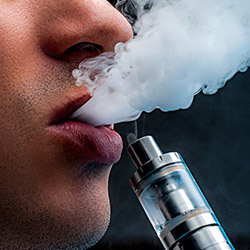 Ohio’s new “Tobacco 21” law takes effect today, October 17, 2019. The law raises the age to purchase cigarettes and other tobacco products, as well as e-cigarettes, vaping, and other nicotine products from 18 to 21. It will also be illegal to give such products to others under age 21. Tobacco use is the foremost preventable cause of premature death in the United States, is responsible for approximately 480,000 deaths a year, and has contributed to 208 million premature deaths in the United States since the Surgeon General’s 1964 smoking report. Moreover, smoking is linked to $300 billion in national health care and lost productivity costs per year. “Tobacco 21 represents an opportunity for public health law to mitigate an important national health risk,” commented Lake County Health Commissioner Ron Graham. “We applaud the jurisdictions that have already adopted Tobacco 21 voluntarily, such as the City of Wickliffe, who did so on May 29, 2018. This legislation will protect our youth from unnecessary illness and lifelong addiction.”
Ohio’s new “Tobacco 21” law takes effect today, October 17, 2019. The law raises the age to purchase cigarettes and other tobacco products, as well as e-cigarettes, vaping, and other nicotine products from 18 to 21. It will also be illegal to give such products to others under age 21. Tobacco use is the foremost preventable cause of premature death in the United States, is responsible for approximately 480,000 deaths a year, and has contributed to 208 million premature deaths in the United States since the Surgeon General’s 1964 smoking report. Moreover, smoking is linked to $300 billion in national health care and lost productivity costs per year. “Tobacco 21 represents an opportunity for public health law to mitigate an important national health risk,” commented Lake County Health Commissioner Ron Graham. “We applaud the jurisdictions that have already adopted Tobacco 21 voluntarily, such as the City of Wickliffe, who did so on May 29, 2018. This legislation will protect our youth from unnecessary illness and lifelong addiction.”
Approximately 95% of adult smokers begin smoking before age 21; and between the ages of 18 and 21, many smokers move from casual smoking to regular daily use. The developing brains of those 21 and under are particularly susceptible to the addictive properties of nicotine, and those who start smoking by the age of 18 are almost twice as likely to become lifetime smokers, as opposed to those who start after the age of 21.
Each day, more than 3,200 youth under the age of 18 smoke their first cigarette, and nine out of 10 smokers start before the age of 18. The 2014 Lake County Youth Health Status Assessment reported that 10% of youth in grades six through 12 were smokers, increasing to 19% of those who were over the age of 17. Of the current youth smokers in Lake County, 22% smoke cigarettes on a daily basis. The average age of initiation in Lake County is 13 years of age, and 85% of youth who identified as current smokers were also current drinkers. In addition, ninety percent of all adults who purchase tobacco products for minors are between the ages of 18 and 209, and increasing the minimum tobacco sale age to 21 could eliminate minors’ ability to buy from fellow students. “We have seen electronic smoking devices used by youth as young as middle-school aged. We have had parents and school staff reach out for information to help prevent the problem from getting worse. Our hope is that the Tobacco 21 Law will aid in this prevention,” said Shaelin Hurley, Health Educator at Lake County General Health District.
The types of tobacco and alternative nicotine products covered by the new law include cigarettes; electronic smoking devices, such as vapes, e-cigarettes, and tanks; cigars; pipe tobacco; chewing tobacco; snuff; snus; dissolvable nicotine products; filters, rolling papers, pipes, blunts, or hemp wraps; liquids used in electronic smoking devices whether or not they contain nicotine; and vapor products – any component, part, or additive that is intended for use in an electronic smoking device, a mechanical heating element, battery, or electronic circuit and is used to deliver the product. Tobacco products and alternative nicotine products do not include products such as nicotine replacement therapy for use when quitting tobacco and other nicotine products.
The law requires retailers to post a sign that it is illegal to sell tobacco and alternative nicotine products to anyone under the age of 21. A clerk who sells tobacco or alternative nicotine products to a person under 21, as well as the owner of the retail establishment may face criminal penalties that increase after the first violation under Ohio’s Tobacco 21 law. For a first offense, a misdemeanor of the fourth degree, a clerk is subject to no more than 30 days in jail and a fine up to $250, and the retail establishment is subject to a fine of $2,000.
For more information about Ohio’s Tobacco 21 law, go to OhioTobacco21.gov or call the toll-free hotline at 1855-OHIO-T21. Lake County General Health District offers one-on-one smoking cessation counseling services with certified Tobacco Treatment Specialists (TTS). For more information, please contact Shaelin Hurley at (440) 350-2464.
